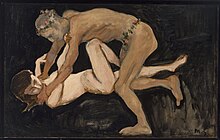Drugs and sexual consent
This article contains close paraphrasing of a non-free copyrighted source, https://doi.org/10.1007/s11065-007-9031-0 (Copyvios report). (August 2023) |

Drugs and sexual consent is a topic that discusses the impacts of
The definition of sexual consent, "agreement to engage in
Most studies on drug and sexual consent are based on self-reports that emphasize the psychological and sociological aspects, while the direct biological mechanisms remain largely unexplored. However, the indirect physiological effects of drugs on sexual consent, such as impaired cognition and judgment, may lead to changes in
Psychological and sociological aspects
A study demonstrated three ways drugs could affect sexual consent in psychological and sociological aspects.
Increased perceived sexual autonomy

Drugs could improve the autonomous aspect of sexual consent, thus raising the tendency of the user to engage in both desired and undesired sex.[3]
Firstly, drug use may diminish cognitive issues that keep people from engaging in sexual behaviors.
Through expanding user's sexual boundaries and limitations, drug also improves people's participation in different varieties of sex, including those that are previously undesired.
Individuals on drugs reported feelings of intimacy, trust, love, and a strong desire to have sex with multiple sexual partners.[3] Due to the symbolic nature of closeness and trust, drug use may also boost a desire to engage in sex without using condoms.[3] Once the effects of the drugs wear off, these emotional attachments may fade away, leading to emotions of regret.[8]
Others' perception of drug users being sexually available

Individuals on drugs claimed to be viewed by others as sexually available, that is, more likely to provide consent to engage in sexual activities.
Minimize the capability to communicate consent
Several studies have found that significant drug use can impair or change
Drugs also impair the capability to communicate sexual consent.
Biological activity of drugs
Although it is commonly believed that recreational drugs act as aphrodisiacs and serve as preludes to sexual activities, their specific mechanisms remain to be explored.[14] Various models have been composed to imitate the drug kinetics of these drugs on sex. However, most drug-sex study data were collected from small sample interviews and self-reports.[15] Social environment, drug dosage, duration of use, and user characteristics are other factors that should be considered.[16]
The section focuses on discussing several most used recreational drugs. Methamphetamine, which has more direct studies on its biological mechanism of sexual consent, is also explained.
Alcohol

Alcohol is a depressant and a psychoactive drug that can alter human behavior.
However, other studies suggest excessive alcohol may have negative effects on sex. Alcohol can interfere with the release of sexual

Marijuana
Marijuana, also known as cannabis, is of the highest consumption in the recreational drug market.[22] 70% of marijuana consumers viewed it as an aphrodisiac and 81% increased sexual delight and satisfaction.[23] However, limited physiological evidence indicates that it stimulates sexual desire or improves sexual function.[15] Most evidence suggests the link between the two is indirect. Delta-9-tetrahydrocannabinol (THC), the primary psychoactive component of marijuana, has a similar structure to the neurotransmitter anandamide. THC can target the hippocampus and orbitofrontal cortex to affect memory formation and induce hallucinations.[15][24] It also influences feelings of pleasure, sensation, and other cognitive functions.[25] In addition, high THC dosage impairs basic motor control and reactions.[25] The ability to communicate consent after initiating sexual activities decreases while intoxicated. However, the mechanisms of the self-reports effect of marijuana to promote sexual enjoyment are still unclear. This stimulation could result from a general improvement in sensory experience.[15]

Opioid
Previous research has been limited to self-report studies. However, opioid sedation can impair
Methamphetamine

Methamphetamine (MA) is a potent stimulant impacting the CNS. From self-report studies, It has been found to enhance sexual desire, promote pleasure, and delay orgasm.[15] However, methamphetamine use is greatly associated with high-risk sexual behaviors and reduction in sexual inhibition.[29][30] Methamphetamine can increase the likelihood of engaging in atypical sexually behaviors, such as pedophilia, group sex, and same-sex intercourse among heterosexual individuals.[25]
One issue related to sexual consent concerns whether agreement is made under conscious conditions. Methamphetamine abuse is linked to neurotoxicity in the brain and has deleterious effects on cognitive processes,[31] for example, deficits in episodic memory, executive functioning, information processing speed, motor skills, and language abilities.[32] The impairment of cognitive ability could thus lead to diminished capability to provide informed and enthusiastic consent.
Furthermore, Methamphetamine users have been found to differ from non-users in high-risk behavior related neurocognitive decision-making processes.[33] This research reveals the weaker activation of the risk and reward-modulating regions in brains of casual drug users. As the system is responsible for handling risks and rewards, neurological differences suggest that during decision-making, methamphetamine users may be less concerned about the potential risks associated with a choice. Instead, they may focus more on the potential gains and immediate outcomes. This could explain why methamphetamine users may engage in high-risk sexual behaviors or have sex with partners who they would not in sobriety. They only consider the immediate pleasure rather than long-term risks.
Animal studies confirm that methamphetamine and sexual behavior activate the same neurons in the CNS responsible for motivation and reward.[34] Methamphetamine and sexual behavior are considered as "rewards" that trigger the release of dopamine, causing feelings of pleasure and satisfaction. These pleasurable feelings in turn acts as a motivation again, encouraging people to compulsively seek natural rewards. In sum, this co-activation of neuronal populations suggests that methamphetamine use leads to compulsive seeking of natural rewards, in this case, sexual behavior, proving the drug heightens sexual consent autonomy.
Drug-facilitated sexual assault (DFSA)

Drugs do not only affect one's decision on sexual consent but also cause a loss of ability to express it.
Ethanol
Ethanol is sometimes used as a date rape drug, as it can cause
Benzodiazepines
Benzodiazepines are medications used to treat anxiety, stress, and insomnia. When the drug binds to the GABA receptor, sedation and muscle relaxation occurs.[35] Flunitrazepam is a common benzodiazepine used in rape facilitation since it causes memory blackouts.[36]
Ketamine
Gamma-hydroxybutyrate (GHB)
GHB have a chemical structure similar to neurotransmitter GABA. It is commonly used as a date rape drug due to its euphoric and CNS depressant effects[39] which can slow down brain activity. Additionally, individuals may experience poor concentration and confusion after taking GHB.[40]
Application
Drug-taking was found to impact the capacity to make sexual decisions, raise engagement in
A key aspect of harm reduction is educating those who might use sex-related drugs about the consequences of doing so, and encouraging them to evaluate their possible sexual partners.
References
- ^ "What Is Sexual Consent?: Facts About Rape & Sexual Assault". www.plannedparenthood.org. Planned Parenthood. Retrieved 2022-04-12.
- ISSN 0022-4499.
- ^ S2CID 209895703.
- S2CID 44423781.
- ^ S2CID 145751301.
- ^ S2CID 144254144.
- ^ PMID 27938393.
- PMID 29801810.
- PMID 26240068.
- .
- S2CID 32043319.
- ISBN 978-1-906673-18-5.
- PMID 27439599.
- ^ a b c McKay, Alexander (2005). "Sexuality and substance use: The impact of tobacco, alcohol, and selected recreational drugs on sexual function". The Canadian Journal of Human Sexuality. 14 (1).
- ^ S2CID 27215932.
- ^ a b Rosen, Raymond (1991). "Alcohol and Drug Effects on Sexual Response: Human Experimental and Clinical Studies". Annual Review of Sex Research. 2 (1).
- ^ "Is Alcohol A Drug?". Orlando Recovery Center. 28 March 2023. Retrieved 2023-04-13.
- PMID 12873241.
- )
- PMID 3070052.
- PMID 21439287.
- ^ "WDR 2022_Booklet 2". United Nations : Office on Drugs and Crime. Retrieved 2023-04-12.
- ^ PMID 6981694.
- ^ Abuse, National Institute on Drug (July 2020). "How does marijuana produce its effects?". National Institute on Drug Abuse. Retrieved 2023-04-12.
- ^ PMID 6126532.
- S2CID 17757207.
- PMID 26461075.
- S2CID 15293275.
- S2CID 23790582.
- S2CID 43474362.
- S2CID 14865032.
- S2CID 21174399.
- PMID 30612937.
- PMID 20045448.
- ^ S2CID 220522090.
- ISBN 9780124167483. Retrieved 2023-04-12.
- PMID 23814094.
- ISSN 1984-4905.
- PMID 26074743.
- ^ Abuse, National Institute on Drug (2018-03-06). "Prescription CNS Depressants DrugFacts". National Institute on Drug Abuse. Retrieved 2023-04-12.
- PMID 20163383.
- S2CID 24540584.
